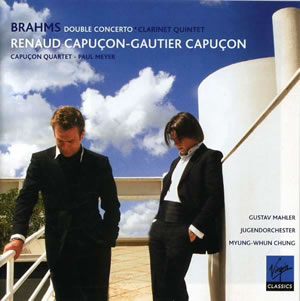![]()
CD Review
© Tim Perry, December 2007
Also published by MusicWeb International
 |
Brahms: Double Concerto in A minor, Op 102 - Clarinet Quintet in B Minor, Op 115.
Renaud Capuçon (violin), Gautier Capuçon (cello), Paul Meyer (clarinet), Capuçon Quartet, Gustav Mahler Jugendorchester conducted by Myung-Whun Chung.
Live recordings 2007, Osterfestspiele - Grosses Festspielhaus, Salzburg, Austria; Grazer Kongress – Stefaniensaal, Graz, Austria); Wiener Musikverein, Vienna, Austria; Eglise du Bon Secours, Paris, France.
Virgin Classics 3951472 • 73' •
The brothers Capuçon are a force of nature. Their new account
of the Brahms Double Concerto radiates a gripping intensity matched by
no other in the catalogue. Usually when comparing a new recording of this
piece to my benchmark recordings – Oistrakh with Fournier and Oistrakh
with Rostropovich – I soon begin to feel sorry for the newcomer.
Not so here. Renaud and Gautier Capuçon yield nothing to the most
exalted competition.
From the bold, quasi-improvisatory first statement of Gautier Capuçon's
cello, it is clear that autumnal sentiment is to play no part in this
performance. Where Fournier is aristocratic and Rostropovich commanding,
Gautier Capuçon is brooding and feisty, his tone like a rich port
wine. His brother is hardly less passionate, and when he joins the fray
than the brothers begin to strike sparks off one another, and the orchestra.
The outer movements surge with wild abandon, and the central movement
heaves and sighs with passionate longing. Every phrase is surprising here,
emerging with the freshness of new adventure.
I compared this performance to the recent account from Julia Fischer and
Daniel Müller-Schott on Pentatone. The contrast is telling. The Pentatone
performance is very good, and has a lovely lightness to the interplay
between the soloists. It demonstrates emphatically, though, the greater
maturity of the Capuçons' conception of the piece, for all the
impetuosity of their performance.
They are aided and abetted by a sympathetic Myung-Whun Chung, who leads
the Gustav Mahler Jugendorchester with great dramatic flair. While the
music gushes forth with unstoppable momentum, he never allows the accompaniment
to become insensitive, and coaxes some gorgeous detail from his players.
The clarinet, for example, conjures a moment of repose at about 6:30 into
the first movement that is meltingly beautiful.
The liner-notes suggest that the Double Concerto was pieced together from
three separate concert performances given over three days in April this
year in three different venues. Be not afraid, though. Michael Seberich's
engineering presents a seamless, warm acoustic. There are no audience
noises to speak of either.
The coupling for the Double Concerto is unusual and generous. Rather than
offering up another Beethoven Triple or a solo turn for Renaud in the
Brahms violin concerto, the brothers team up with the other members of
their quartet and the clarinetist Paul Meyer for a glorious reading of
the Brahms clarinet quintet. Dating from roughly the same time in Brahms'
life, it makes a perfect disc mate and the performance is every bit as
committed. Renaud leads the quartet with style and Gautier supplies a
rock solid bass. The other members of their quartet match their intensity,
as does the fantastic Paul Meyer, whose virtuosity is as impressive as
his melted-butter tone is glorious.
The excellent liner notes may quote Claude Rostand's assessment of this
piece as “a great, resigned confession, steeped in a melodic atmosphere
full of tenderness”, but this performance sparkles with a fresh
vitality that makes you sit up and take fresh notice of this gorgeous
piece.
The studio recording is expertly balanced, this time by Michel Pierre.
No matter how many recordings of these pieces you have in your collection,
you need to buy this disc. It is one of the essential purchases of 2007.